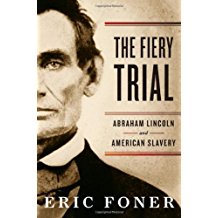The Fiery Trial: Abraham Lincoln and American Slavery, Eric Foner, 2010
Foner, the DeWitt Clinton Professor of History at Columbia won the Pulitzer Prize in 2010 for this non-fiction work and also taught the MOOC on the Civil War which I completed in preparation for the Winthrop House mini-reunion in Richmond. The book follows the development of Lincoln’s thinking, speaking, and acting with regard to slavery, from his days as a Springfield, IL lawyer, then state representative, then a one-term Congressman, a candidate for U.S. Senate through election by the Illinois Legislature, his debates with Stephen A. Douglas, his nomination for the Presidency by the Republican Party (split between Abolitionists/Radicals and Conservatives), his election and his conduct of the Civil War. Battles and the usual ‘stuff of history’ are largely relegated to the sidelines as Lincoln moves slowly from his initial approach of only limiting the spread of slavery and keeping it out of the new states and territories to full Emancipation and even Negro suffrage. From a policy of gradualism, compensation for slaveholders, and relocation to the Emancipation Proclamation of January 1, 1863 and to his initial approaches to Reconstruction before his assassination on April 14/15, 1865, Lincoln travelled a steady path to understanding the moral depravity of slavery and the need to redefine the Nation in terms of freedom. Well-written and fast moving, this is an excellent book about our greatest president.



